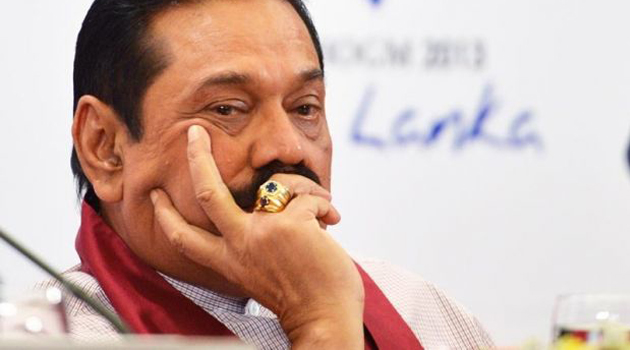“My dream of becoming prime minister has faded away,” Rajapakse told AFP. “I am conceding. We have lost a good fight.”
Rajapakse accepted that his United People’s Freedom Alliance (UPFA) had lost even before Elections Commissioner Mahinda Deshapriya could announce the final results.
It was a major reversal for Rajapakse, who led Sri Lanka for a decade before he was dramatically ousted by President Maithripala Sirisena in January, and had expressed confidence he could return to power as prime minister.
“There were some who criticised me then for conceding so early in the count, but I did it because it was the right thing to do,” Rajapakse said of the January polls. “This time too we have lost.”
“We have won eight districts and the UNP (ruling United National Party) has 11 (out of a total of 22),” Rajapakse said. “This means we have lost. It was a difficult fight.”
No party appears to have secured an absolute majority of 113 seats in the 225-member parliament, which will force the new government to seek out smaller allies.
Sirisena had called the election a year ahead of schedule in a bid to strengthen his numbers in the parliament so he could push through promised reforms.
Deshapriya said he expected to release final party positions by midday Tuesday, while individual votes garnered by candidates would be announced later.
– Referendum on Rajapakse –
Rajapakse remains hugely popular among large sections of the majority Sinhalese community for presiding over the crushing defeat of Tamil guerrillas in 2009 after their 37-year war for a separate homeland.
But the 69-year-old remains a polarising figure on an island still struggling to come to terms with the past.
He was shunned by Western governments over the brutal end to the island’s ethnic conflict, and remains deeply unpopular among its Tamil and Muslim minorities.
The perception that nepotism and corruption flourished during his administration also damaged his political reputation.
Rajapakse secured a seat in the parliament by standing from the north-western district of Kurunegala after ditching his home constituency of Hambantota where three of his close family members contested.
His main rival, Prime Minister Ranil Wickremesinghe, was meeting Tuesday with campaign workers as his UNP party celebrated their victory and is expected to form the next government.
Wickremesinge had described Monday’s vote as a referendum on a return to politics by Rajapakse, telling reporters on Monday he was confident of forming a new government that could “consolidate the January 8 revolution” — a reference to Sirisena’s victory.
Rajapakse had cultivated close ties with China during his decade in power, but Sirisena and Wickremesinghe have been trying to steer Colombo away from Beijing’s close embrace and have made concerted efforts to improve ties with giant neighbour India.
– Peaceful vote –
Defeated Rajapakse said he feared that Wickremesinghe’s UNP, which is set to secure the highest number of seats in the 225-member assembly, may try to secure defections from the opposition.
“They don’t have 113 seats and will try to engineer defections from our side,” Rajapakse said.
Since his surprise victory over his former mentor, Sirisena has struggled to impose his authority over his United People’s Freedom Alliance (UPFA) party and was powerless to prevent Rajapakse from standing as one of its candidates.
He threatened to invoke his executive powers to prevent his combative predecessor from becoming prime minister, but Rajapakse was banking on a strong showing to force Sirisena to back down.
Deshapriya said the vote had been one of the most peaceful in Sri Lanka’s history.
The mood on the streets was subdued on Tuesday, with celebrations and street processions banned for a week after the polls under Sri Lankan election laws.















































